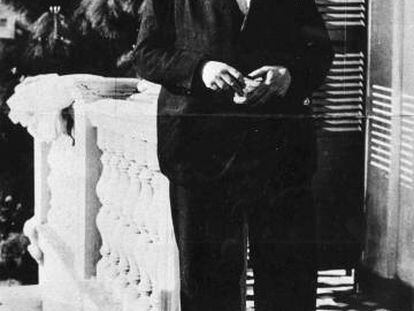“Catalans have been exposed to a falsified version of history for years:” John Elliott
UK historian argues regional schools and Spanish nationalists both to blame for current crisis


Funnily enough, John Elliott got started on the history of Spain via Catalonia. Before that, he had traveled across the Iberian peninsula with a group of friends, riding in a British army truck and sleeping in third-rate boarding houses or under olive trees.
It was the 1950s and poverty was everywhere on display, but what really captured the imagination of this historian – who won the Prince of Asturias Award in 1996 – was Spanish people’s dignity in the face of so much need, hunger and ignominy. “A tremendous dignity,” he recalls about those days. “Together with the grandeur of places like the Prado Museum.”
I am optimistic by nature. But not everything in this world is rational
Fast-forward to today. Spain seems, in many ways, to have leapfrogged the 20th century, moving from the 1800s straight into the 21st century. From secular backwardness to modernity, all at the speed of light. “Historians like myself who write about this country made the same mistake,” he says. “We were unable to predict the enormous change that took place from 1978 to the present. We did not analyze the impact of the desire for reconciliation that comes from having suffered through a civil war.”
Elliott calls himself a historian because he dislikes the word Hispanist. But at age 87, he has agreed to speak at the Cervantes Institute’s inaugural session of Tribuna del Hispanismo, a quarterly discussion panel that will feature other leading foreign scholars of Spanish history such as Paul Preston, Ian Gibson and Stanley Payne.
“I think that the history of Spain has suffered tutelage from outside: a sort of feeling of superiority from which it might be deduced that we foreigners know this history better than yourselves. And that is not the case,” notes this Regius Professor Emeritus at Oxford University.
Contrary to what is believed, political and economic centralism do not coincide in Spain
Elliott’s area of expertise is the period ranging from the 15th to the 18th centuries, and there are very few aspects of it that he is not familiar with. This includes Catalonia and the revolt that King Felipe IV suffered there, and in Portugal, in 1640. Elliott’s first study on Spain, which he wrote in the 1950s, versed on this topic.
“It was one of the most serious episodes of his reign. Today’s grievances partly stem from there,” says Elliott.
In 1640, under the Count Duke of Olivares, a Catalan republic was proclaimed that lasted all of one week, with initial support from France that was suddenly withdrawn, and with economic agents up in arms. If we change those three elements for a unilateral declaration of independence, a Europe that does not support the schism, and the business exodus taking place in Catalonia right now, very little seems to have changed in four centuries.
Great master of history
Sir John Huxtable Elliott trained at Cambridge and taught at Oxford, and has given the world a wealth of knowledge about modern history and the Spanish empire. His many works of reference include The Revolt of the Catalans: A Study in the Decline of Spain, 1598–1640. Elliott is currently working on an exploration of the parallels between Scotland and Catalonia.
“I understand the reasons that may have led to this,” says Elliott. “Especially after the Franco years. But failing to appreciate the incredible change that has taken place both in Spain and in Catalonia over the last 40 years is a tremendous mistake.”
Elliott feels there are other elements that explain why things are what they are today.
“Education, for instance. With their devolved powers, throughout the 1980s, under (longtime premier) Jordi Pujol, generations have been exposed to a falsified version of history, a manipulation with nationalist tendencies. They have deliberately concealed the parts where it would have been fair to talk about the progress that’s been achieved.”
But Spanish nationalism has not helped either, says the historian, who recommends recognizing diversity as a factor that makes everyone richer. Elliott believes that Catalonia and the Basque Country, above all, should be recognized as nations, but he also thinks that in the effort to offer them more economic and cultural powers back during the democratic transition, some regions may have gotten a little too much. Nor is a federal structure a good option: “In Spain it would be too artificial, it won’t do.”
Elliott believes the federal structure would not be a good option in Spain as it is “too artificial”
Elliott’s latest book will go on sale in the fall of 2018. In it, he compares the cases of Scotland and Catalonia, and finds several differences.
“One difference is that, contrary to what is believed, political and economic centralism do not coincide in Spain. They do in Britain. London is the capital on both fronts, whereas in Spain, Madrid is the political center in terms of decision-making, but Barcelona has been the economic capital for centuries.”
The manuscript is not finished, however. “I’m still missing half of the last chapter. It’s very suspenseful these days, the end is being written.”
Is he optimistic about the outcome? “I am optimistic by nature. But you need to take into account that not everything in this world is rational.”
English version by Susana Urra.












































